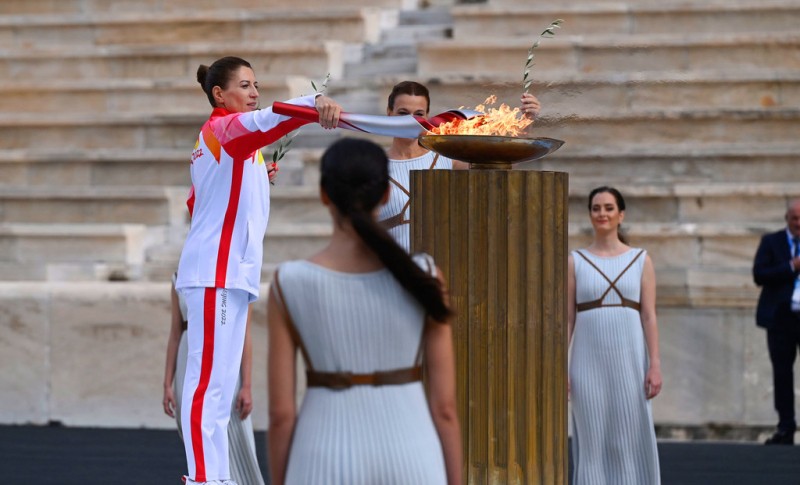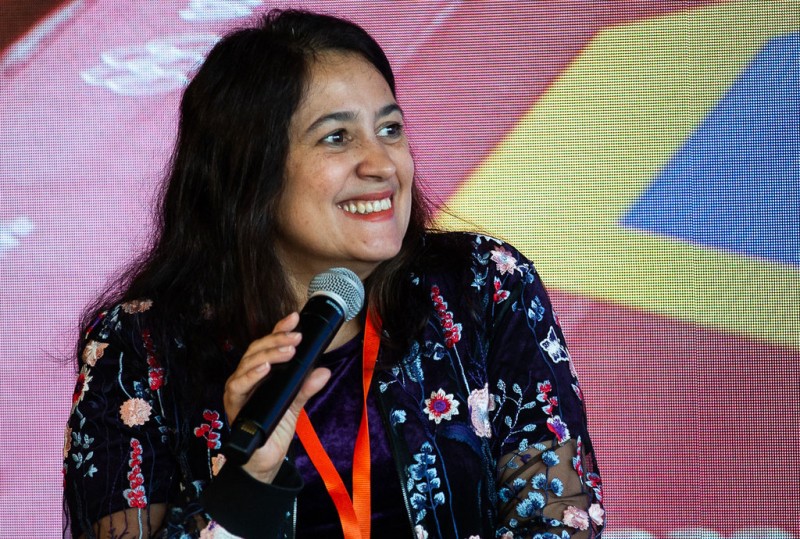IOC/Thomas Lovelock Athlete prepares for the Winter Olympics.
Tania Braga, who heads the IOC legacy department, helps hosts of the Olympic Games to create lasting positive impacts for local communities in line with global sustainability goals. She says the 2024 Paris Games will be the first event to implement a full range of new measures aligning sport with development and climate action.
UN News spoke with Ms. Braga ahead of the International Day of Sport for Development and Peace, observed on 6 April.
UN News: As the Olympics continues to grow, both in terms of sports and participation, are there any considerations and discussions on the impact on the environment?
Tania Braga: The Games are not growing. There is a limit in the numbers of athletes that can participate, and even with new sports, the total number of athletes remains constant to avoid the Games becoming too big. The IOC focuses heavily on limiting the Games’ footprint. There are no new venues required for hosting. The focus is on using existing location and only building new ones if very clear long-term needs are in place. The 2028 Los Angeles Games are going for “radical reuse”. That means using 100 per cent of existing or temporary venues. In this regard, the 2024 Paris Games is currently at 95 per cent.
IOC has always been concerned about assessing and minimizing the Games’ impact on the environment and local communities. We have built a series of recommendations and requirements to help each organizer, host city, or region to adapt to challenges. We have a saying that guides everything we do: The host city or region doesn’t need to change to receive the Games, but the Games should adapt to the host city or region. We have some requirements, including certification for sustainability management and 50-per-cent emissions reductions, aligned with the Paris Agreement on climate change. Adapting to local needs while creating a maximum positive impact on communities and reducing the local negative environmental impact – that’s the spirit.
© IOC Tania Braga, Head of Impact and Legacy at the International Olympic Committee (IOC).
UN News: How does the IOC evaluate a host city’s success in meeting the IOC’s sustainability goals, and if it’s not, what practical action can the IOC take?
Tania Braga: Hosts must have a policy, strategy, and plan and must monitor, measure, and report in a transparent way, using existing international standards. When that doesn’t exist, we collaborate with other organizations to create one. This work is almost concluding for the 2024 Paris Games, which will be a pilot for using this methodology and consensus. No two Games editions are the same. Tokyo and Paris are two different societies, and we need to consider each host’s geographical, political, social, or economic context. It’s done using an approach that includes engaging organizers, host cities and regions, and local stakeholders to understand what’s important for them to measure. Currently, they all have sustainability reports, which are an obligation in IOC host contracts.

IOC/Milos Bicanski Beijing 2022 – Handover Ceremony of the Olympic Flame in Athens, Greece.
UN News: Is the Olympic Agenda 2020 where the greening of the Olympics philosophy came from, and when did sustainability and legacy reporting requirement start?
Tania Braga: Agenda 2020 became a real game changer in the way the IOC chooses the hosts and manages the Games. Sustainability was present on a voluntary basis as early as the 1994 Lillehammer Games. With Agenda 2020, sustainability became part of the heart of the Games. As the climate crisis is accelerating, we need to answer strongly. IOC addresses other global issues, such as obesity and its link with the lack of physical activity, which we know from World Health Organization (WHO) data. Over five million deaths could be avoided every year if people were more active. We now require hosts to establish lasting policies to address such concerns. At the Paris Games, 75 per cent of suppliers are small and middle-sized enterprises, key actors in addressing economic inequalities. It’s really impressive they reached this level when the benchmark is around 10 per cent.

Unsplash/Erik Zünder Tokyo Olympics is set to start on 23 July 2021, after a year’s delay due to the COVID-19 pandemic.
UN News: Are there sustainability goals that are particularly challenging for host cities, and why is this?
Tania Braga: I think each edition of the Games will have a different set of challenges. For some, they will be more focused. Some areas are very important and always present for us, for example, health and wellbeing, climate, biodiversity, and mobility, and how hosts can contribute to accelerating local policies on sustainable cities and bringing new technology.
The Tokyo Games accelerated energy policies in Japan, demonstrating how they could make steps towards a low-carbon economy by powering the athletes’ village with hydrogen from clean, green sources. Paris is focused on the challenge of physical inactivity, using the Games as an opportunity to push the French Government to adopt a new national policy for elementary school students to get an additional 30 minutes of daily physical activity.
UN News: What are some of the measures being taken to change or address the situation of the challenges that some cities are facing?
Tania Braga: Our approach is to enter a dialogue to provide support and give expert advice. Since 2012, a methodology has been used to calculate the carbon footprint of the event. IOC’s influence encourages others in the sport world to take action. IOC is partnering with the UN Framework Convention on Climate Change (UNFCCC) on the Sports for Climate Action initiative and has mobilized its network of 31 international federations, who must commit to 50-per-cent emissions reductions. These are some examples of measures or even of using just the power and the visibility of the Olympic Games to bring issues to the attention of the global audience. We have an audience; for the Tokyo Games, there were 3.5 billion viewers.

UN News/Abdelmonem Makki A special ‘Scoring for the Goals’ projection at UN Headquarters showcases the power of sport to unite the world and help achieve the Sustainable Development Goals.
UN News: Sustainability is one of the three pillars of the Olympic Agenda 2020. How is this going to impact Olympic Games going forward? And what inspires you?
Tania Braga: Going forward, we will see the full impact because the Games have a long life cycle; Paris was elected seven years ago, and Los Angeles, 11 years before. Paris will be the first edition to have the full impact of Agenda 2020 and then we can see the results. There are a lot of things still to work on, and we continue to collaborate with editions. It’s an evolving agenda. What inspires me is the possibility to drive positive changes and to influence this change with different organizations in the network.
Soundcloud




Comments are closed.